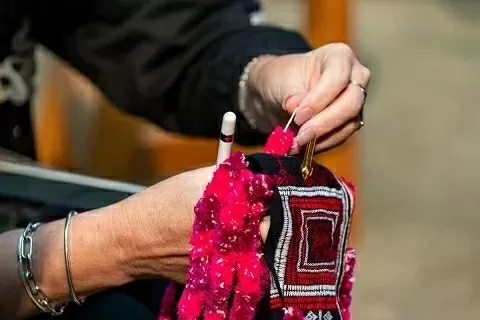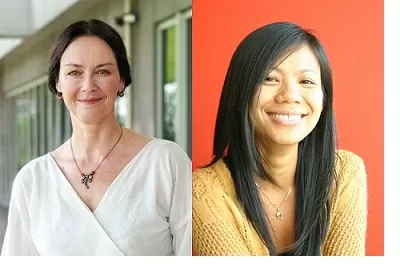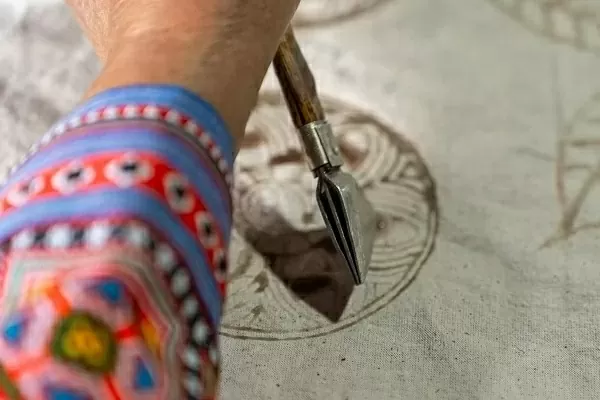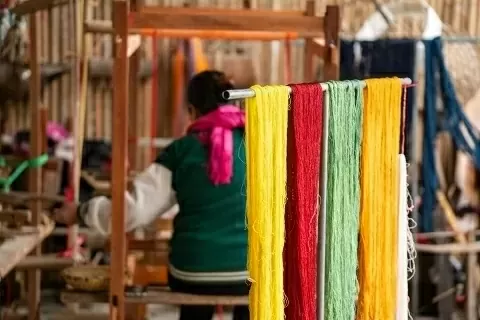
Vietnam’s micro and small enterprises: Shaping a sustainable fashion ecosystem
Latest
 |
| Shaping a Sustainable Fashion Ecosystem in Vietnam: Fashion enterprises in Vietnam are blending cultural heritage with sustainable innovation, creating products that reflect both local identity and contemporary value. (Source: Vietnam Design Research Studio) |
The creative landscape is evolving
Over the past three decades, many countries have strategically developed their creative economies to harness knowledge, talent and cultural identity. The model was first introduced in Australia’s Creative Nation report in 1994 and later expanded through initiatives in the United Kingdom in 1997.
At its core, the creative economy highlights the pivotal role of individuals and micro, small and medium-sized enterprises (MSMEs) in generating employment, added value and quality of life through intellectual and cultural resources.
In Vietnam, the creative economy is undergoing a significant transformation. Prime Minister’s Directive No. 30/CT-TTg, issued in August 2024, prioritises investment in human resources and technology for cultural industries such as fashion, handicrafts and design.
Vietnam has witnessed notable creative initiatives, including the Vietnam International Fashion Week (VIFW) and Vietnam Design Week (VDW). However, these are mostly privately operated and still lack long-term, strategic support from public institutions.
This gap is even more apparent when compared to successful models in South Korea and China. Backed by the Seoul Metropolitan Government, Seoul Fashion Week has effectively integrated trade promotion, exhibitions and education through flagship initiatives such as Seoul Collection and Fashion Fair.
Likewise, since 2001, Shanghai Fashion Week has benefited from comprehensive support by China’s Ministry of Commerce, resulting in a robust creative ecosystem.
By contrast, Vietnam’s fashion enterprises, often small in scale but rich in creativity, continue to navigate challenges largely on their own. They face a lack of clear policy guidance, public investment and mainstream media recognition.
Despite these constraints, MSMEs remain the backbone of Vietnam’s textile and garment sector, accounting for approximately 80% of all enterprises and employing over three million workers.
Operating largely as family-run or small group ventures, they may not own large factories or have significant marketing budgets. Yet, it is these very enterprises that are quietly laying the groundwork for a sustainable fashion ecosystem rooted in local identity.
Advancing sustainable fashion
A study conducted in late 2024 by Associate Professor Donna Cleveland and PhD candidate Lam Hong Lan (Faculty of Communication and Design, RMIT Vietnam) revealed a nuanced portrait of micro and small fashion enterprises quietly building what the researchers describe as a “circle of prosperity”. In this model, the four pillars, economic, cultural, environmental and social, do not merely coexist but interweave and mutually reinforce one another.
 |
| Shaping a Sustainable Fashion Ecosystem in Vietnam: Associate Professor Donna Cleveland (left), Dean and Lam Hong Lan (right), PhD candidate and lecturer in Fashion, Faculty of Communication and Design, RMIT University Vietnam. (Source: RMIT) |
Analysing five case studies in Hanoi and Ho Chi Minh City, including Linht Handicraft, Kilomet109, Moi Dien, KHAAR and Dong Dong, the study illustrates how micro-enterprises can maintain small-scale, community-based production while promoting innovation rooted in sustainability and cultural identity.
Linht Handicraft collaborates with H’mong women in Sa Pa, using handwoven, indigo-dyed textiles to craft products imbued with local character. Moi Dien, founded by designer Tom Trandt, operates under a zero-waste model and partners with senior tailors in Ho Chi Minh City, an approach that not only preserves traditional skills but also creates an adaptive and resilient production chain. Kilomet109, led by designer Thao Vu, engages with seven ethnic artisan communities across Vietnam to revive time-honoured dyeing and weaving techniques that are at risk of disappearing.
Beyond heritage preservation, these enterprises are also integrating technology and circular design thinking to elevate sustainability.
 |
| Shaping a Sustainable Fashion Ecosystem in Vietnam: To promote sustainable development, experts have proposed reforms in education, the creation of public spaces and the simplification of tax policies for micro and small fashion enterprises in Vietnam. (Source: Vietnam Design Research Studio) |
KHAAR, a young brand founded by Kha Ngo, uses artificial intelligence to create zero-waste cutting patterns from surplus fabric. It has steadily gained recognition through appearances at Vietnam Design Week, the Elle Fashion Show and Vogue Singapore.
Meanwhile, Dong Dong, founded by Anh Tran, specialises in handbags made from discarded advertising tarpaulins and used industrial packaging. Around 80% of its materials are collected from aquaculture farms and supermarkets in the Mekong Delta.
Yet the study also identifies systemic barriers that micro fashion enterprises in Vietnam continue to face. Many struggle to scale due to limited capital and infrastructure. Current tax policies often fail to accommodate business models based on recycled materials or informal labour.
For instance, Dong Dong was once fined for being unable to provide value-added tax invoices for reclaimed materials. Brands like Moi Dien have voiced the need for easily accessible public spaces to exhibit their products and engage with customers, spaces that are notably absent in Vietnam.
 |
| Shaping a Sustainable Fashion Ecosystem in Vietnam: With the right support and enabling policies, micro and small enterprises can play a central role in shaping a culturally rich creative economy in Vietnam. (Source: Vietnam Design Research Studio) |
Grounded in field research and the theoretical framework of Prosperity Fashion, the researchers propose three key policy directions to support micro fashion enterprises more effectively and sustainably.
First, fashion education should be strengthened by more clearly embedding core principles of sustainable fashion, zero-waste production and community-based design into both secondary and tertiary curricula.
Second, greater investment is needed in public creative spaces, which would serve not only as venues for showcasing products but also as platforms for consumer education and cross-sector collaboration.
Third, administrative and financial frameworks should be reformed by simplifying tax procedures, formally recognising non-traditional business models and introducing targeted incentives for businesses that use recycled materials or create local employment opportunities.
With proper support and enabling policies, micro and small enterprises can become the backbone of a culturally rich creative economy in Vietnam. They reflect a global movement toward sustainability. These enterprises embody the potential of small-scale workshops, ethnic minority communities and passionate young designers co-creating a new fashion ecosystem. In this ecosystem, progress is measured not by speed or market size, but by cultural depth, social cohesion and environmental responsibility.
The findings were published in Fashion Highlight, an international peer-reviewed journal specialising in the formation, production and communication of fashion, as well as its aesthetic, cultural and technological dimensions.

















